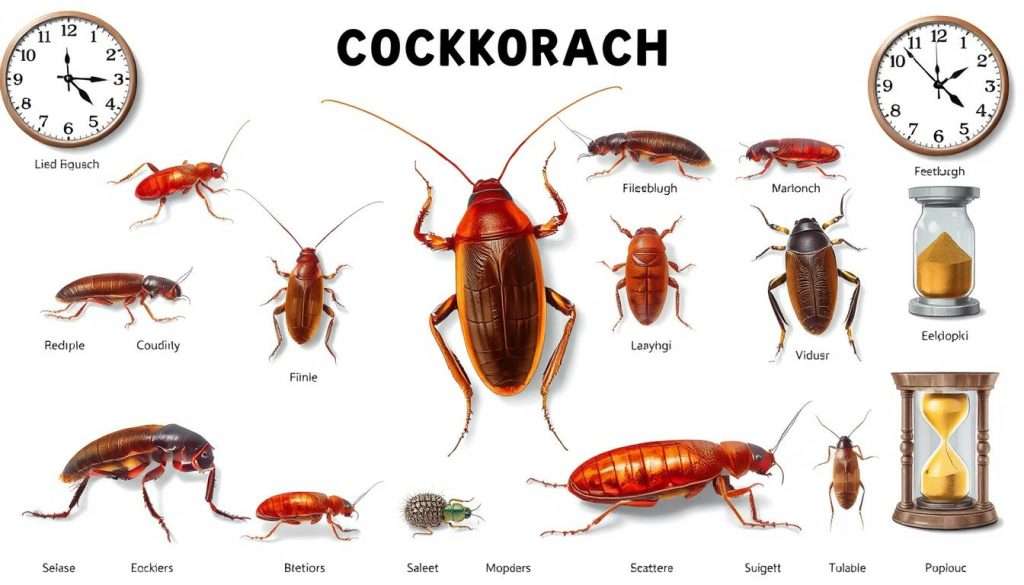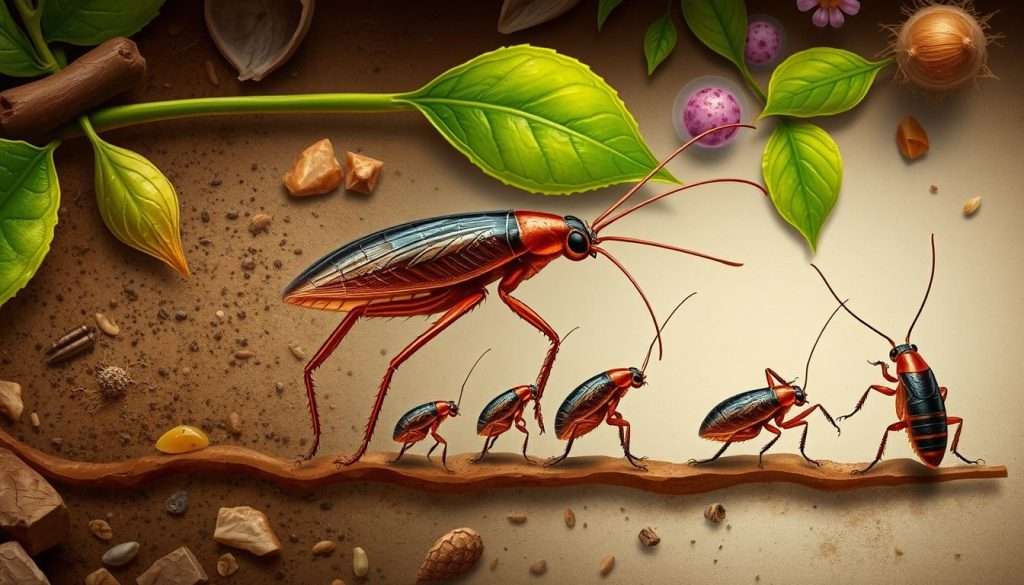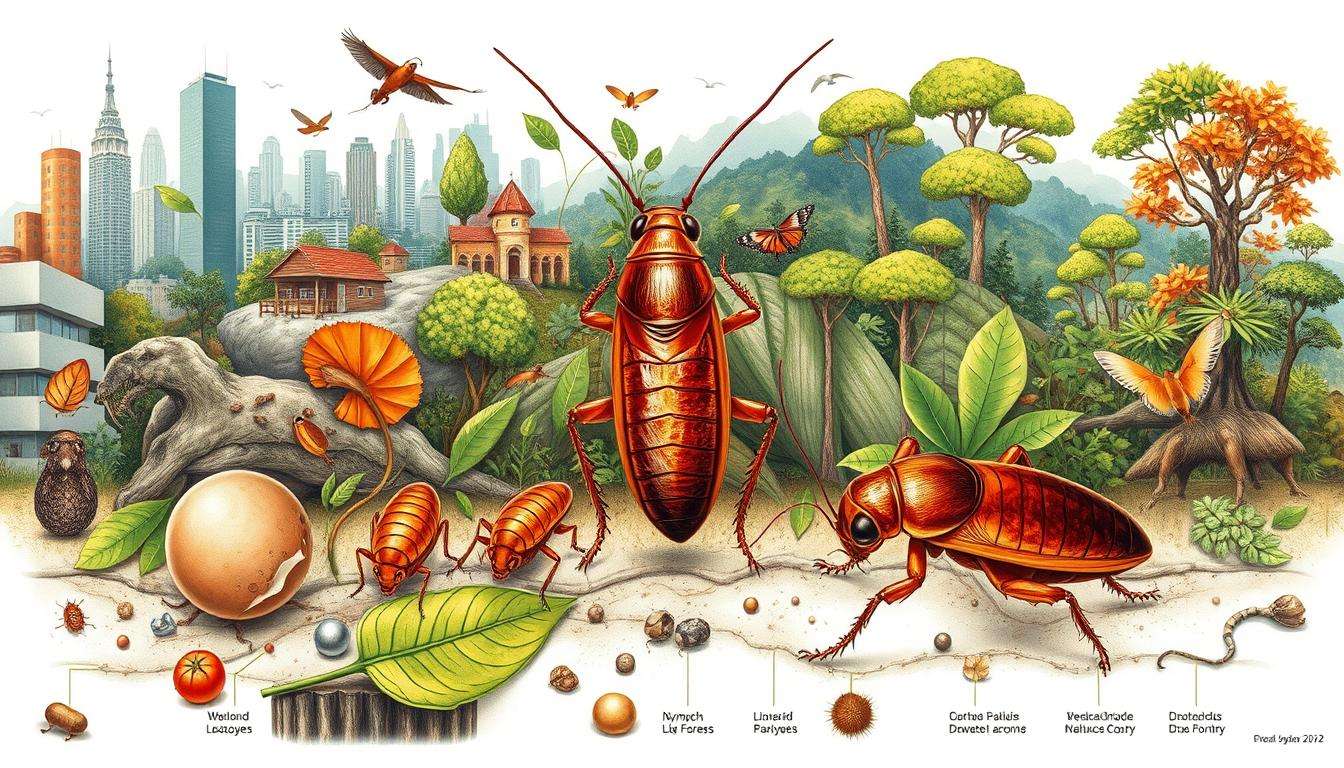Knowing how long cockroaches live is key for homeowners to fight these pests well. The lifespan of cockroaches varies a lot based on their type and where they live. These pests spend about 75% of their time sleeping, making them hard to get rid of.
In this guide, we’ll look at the stages of a cockroach’s life, from egg to adult. We’ll also talk about what affects how long they live.
By the end of this guide, you’ll know a lot about cockroach lifespan. You’ll also learn how to keep them out of your home. Knowing how long these pests can live and thrive will help you fight any infestations.
Key Takeaways
- Cockroaches can live for several months to a few years, influenced by environmental factors.
- They need food and water to survive, living one month without food but only a week without water.
- Cockroach nymphs grow up fast, with some becoming adults in as little as 36 days.
- Temperature and humidity greatly affect how long cockroaches live.
- Knowing the cockroach life cycle is crucial for good pest control and management.
Cockroach Lifespan Overview
Cockroaches have a long and varied cockroach life cycle. This cycle is key to their survival. The lifespan of cockroaches changes a lot, depending on many factors.
Cockroach Life Cycle Stages
The cockroach life cycle has three main stages: egg, nymph, and adult. The eggs hatch into nymphs, which grow into adults in about two to three months.
Average Lifespan of Adults
Adult cockroaches usually live for eight to ten months. But, this can change based on the species. For example:
- American cockroaches can live up to a year.
- German cockroaches live about three months.
- Brown-banded cockroaches last around 80 days.
- Oriental cockroaches live between 34 to 180 days.
Female cockroaches can have many babies. An American cockroach can have up to 150 nymphs. They can get pregnant in just 14 to 30 days.
Factors Affecting Cockroach Longevity
Many things affect how long cockroaches live. Food, water, temperature, and humidity are all important. Some cockroaches like damp places, while others prefer dry ones. These factors greatly affect their survival and how many babies they have. To learn more about controlling cockroach populations, visit this detailed article.
How Long Does a Cockroach Live
Knowing how long a cockroach lives helps fight infestations. Different cockroach types live for varying times. This depends on their environment and food. Knowing this helps us find better ways to control them.
Common Species and Their Lifespans
There are many cockroach types, but some are more common at home:
- German Cockroach: Becomes adult in about 36 days and lives 3 to 6 months.
- American Cockroach: Lives over a year, sometimes up to 2 years.
- Oriental Cockroach: Lives 6 months to 1 year.
Cockroaches are very adaptable. They can live long in good conditions. But, their lifespan changes based on their environment.
Typical Life Expectancy in Varying Environments
How long a cockroach lives changes with its environment. Here’s what to know:
| Environment | Typical Life Expectancy |
|---|---|
| Moisture-rich areas | Up to 2 years |
| Dry environments | 6 months to 1 year |
| Stable temperature with food | 1 to 2 years |
In wet places, cockroaches can live longer. But in dry areas, they dry out fast. Knowing this helps us stop them from spreading.

Cockroach Life Cycle and Mortality Rates
The life cycle of a cockroach is key to understanding their growth. It has distinct stages that affect their survival. They can quickly multiply, growing their numbers in weeks or months.
Stages of Development: Egg, Nymph, and Adult
Cockroaches go through three main stages:
- Egg: A female cockroach lays eggs in an ootheca. It has 12 to 40 eggs. This stage lasts 40 to 75 days before the eggs hatch.
- Nymph: After hatching, the nymph goes through several molts. It grows through its immature stages. This phase lasts several weeks.
- Adult: Once mature, adults can live for months to years. Some become adults in a month, while others take a year.
Mortality Factors in Natural Settings
Cockroach death rates vary in natural settings. Predation, food scarcity, and extreme weather affect their survival. For example, temperature changes can speed up or slow down their growth.
- Predation from birds and other insects lowers their numbers.
- Not enough food and water shortens their life and reproduction.
- Extreme weather can stop their development or kill them directly.
- Indoor environments are risky due to insecticides and control measures.
Knowing about cockroach life cycles and death factors shows their adaptability. It also shows why we need good control measures.
| Life Cycle Stage | Duration | Notes |
|---|---|---|
| Egg | 40 to 75 days | Female lays 12 to 40 eggs per ootheca. |
| Nymph | Several weeks | Undergoes multiple molts before maturity. |
| Adult | Several months to years | Varies by species; some may live several years. |
Cockroach Aging Process and Longevity
Cockroaches have amazing traits when it comes to aging and living long. As they get older, they change in ways that affect how long they live and how many babies they have. This part talks about these changes and how cockroaches manage to live in many different places.
Understanding Cockroach Aging
The aging process changes both males and females in different ways. Males don’t make as many babies as they get older. But, females get better at making babies as they age. They can make many oothecae, which are like baby bags, full of eggs.
- German cockroaches: 4 to 6 oothecae, each with about 30 to 40 eggs.
- American cockroaches: 9 to 10 oothecae, with around 14 to 16 eggs each.
- Oriental cockroaches: about 1 ootheca per week, with around 16 eggs.
- Brown-banded cockroaches: 10 to 20 oothecae, each with about 10 to 18 eggs.
This helps them make up for a lot of baby cockroaches dying. Things like temperature, humidity, and food also play a big role in how long they live.
Survival Adaptations Over Time
Cockroaches have learned to survive in tough conditions. They can go weeks without eating and even live without their heads for up to a week. These skills show how well they’ve adapted and why they’re so successful.
They also have smart ways of finding mates. They use courtship and pheromones to make sure they have babies. This helps them keep their species going.

Knowing how cockroaches age and live long can help us fight them better. By understanding their lives, we can find better ways to deal with them in our homes and communities.
Environmental Factors Influencing Cockroach Survival
Understanding what affects cockroach survival helps us fight infestations better. Things like temperature, humidity, and what they eat play big roles. Knowing these helps us make their homes less welcoming.
Impact of Temperature and Humidity
Temperature and humidity shape cockroach homes. They love warm places, with studies showing more cockroaches in warmer spots. For example, brownbanded cockroaches like it around 80°F.
But, cold can slow them down a lot. Some can handle cold as low as 32°F, but only for a short time.
Humidity is also key for cockroaches. They like moist places to stay hydrated. Research shows more cockroaches in humid areas. But, dry places can make it harder for them to survive.
Feeding Habits and Their Effects on Lifespan
What cockroaches eat affects how long they live. They eat many things, which helps their numbers grow. But, not having enough food makes it harder for them to survive.
Having enough food and keeping places clean is important. This helps keep cockroaches away. Smart strategies can reduce where they can hide and find food.
Conclusion
Knowing how long cockroaches live is key to keeping them out of your home. Different species live for different times. For example, German cockroaches live about 100-200 days. American cockroaches can live up to 2 years.
Things like food, moisture, and shelter affect how long they live. This knowledge helps you take steps to keep them away.
Preventing cockroaches is easier than dealing with them. Keep your home clean and seal up holes. Remember, cockroaches can go without food or water for weeks.
They can also have a lot of babies, making them a big problem. Knowing this helps you fight them better.
Now you know more about cockroaches and how to stop them. Use this knowledge to keep your home pest-free. This way, you can enjoy a comfortable and peaceful home.
